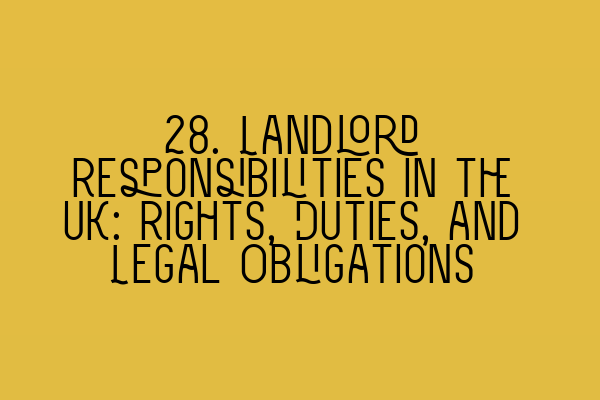Landlord Responsibilities in the UK: Rights, Duties, and Legal Obligations
Being a landlord comes with a range of rights and duties in the UK. Whether you’re a seasoned investor or just starting in the property market, it is crucial to understand your legal obligations as a landlord. Failure to adhere to these responsibilities can result in legal repercussions, financial penalties, and damage to your reputation. In this article, we will explore the key landlord responsibilities in the UK, ensuring that you are equipped with the knowledge to navigate the world of property law with confidence.
1. Providing a Safe and Habitable Property
As a landlord, your primary responsibility is to provide a safe and habitable property for your tenants. This means ensuring that the property meets all health and safety requirements, such as proper sanitation, ventilation, and safe heating systems. It is also essential to address any structural issues that may pose a risk to your tenants’ safety. Regular maintenance and inspections are crucial to identify and rectify potential hazards promptly.
To ensure your property meets the required standards, you must stay updated on the latest health and safety regulations. This can include having adequate fire safety measures in place, providing an annual gas safety certificate, and conducting periodic electrical inspections.
By fulfilling your duty to maintain a safe and habitable property, you not only protect your tenants but also safeguard your reputation as a responsible landlord.
2. Repairs and Maintenance
Landlords have a legal obligation to carry out necessary repairs and maintenance in their properties. When issues arise, they must be addressed promptly and appropriately. Failure to do so can result in tenants taking legal action or seeking compensation, which may include rent reductions or even eviction.
It is essential to have a clear understanding of what repairs and maintenance are your responsibility as a landlord and what falls under the tenant’s responsibility. Generally, landlords are responsible for structural repairs, heating and hot water systems, plumbing, and electrical installations. Tenants, on the other hand, are responsible for minor maintenance tasks, such as replacing light bulbs and keeping the property in a clean and tidy condition.
To stay on top of necessary repairs, regular inspections are recommended. This allows you to identify any issues early on and address them before they worsen. Additionally, maintaining good communication with your tenants can help create a cooperative environment where problems are reported promptly, allowing for timely resolution.
3. Tenancy Agreements and Deposits
A crucial aspect of being a landlord is ensuring that you have robust tenancy agreements in place. These agreements define the rights and responsibilities of both parties and provide a legal framework for the tenancy. They should cover important details such as the length of the tenancy, rent payment terms, and any restrictions or obligations imposed on the tenant.
Additionally, you are required to protect your tenant’s deposit by registering it with a government-approved tenancy deposit scheme. This protects both parties and ensures the proper handling of the deposit at the end of the tenancy.
By having clear and legally-binding tenancy agreements in place, you can avoid misunderstandings and potential disputes, providing a smoother and more secure rental experience.
4. Respecting Tenant Rights and Privacy
Respecting tenant rights and privacy is a fundamental responsibility of every landlord. This includes giving tenants proper notice before entering the property, except in cases of emergency. In most cases, you must provide at least 24 hours’ notice and gain consent from the tenant.
Additionally, you must respect your tenant’s right to quiet enjoyment of the property. This means not interfering with their use and enjoyment of the premises, allowing them to live without unnecessary disturbances or intrusions.
It is also essential to handle any complaints or issues raised by tenants promptly and professionally. Open lines of communication and transparent processes can greatly contribute to a positive landlord-tenant relationship and prevent problems from escalating.
Conclusion
As a landlord in the UK, understanding and fulfilling your legal responsibilities is vital. By providing a safe and habitable property, carrying out necessary repairs and maintenance, having robust tenancy agreements, and respecting tenant rights and privacy, you can ensure a harmonious and lawful relationship with your tenants.
At SQE Property Law & Land Law, we offer comprehensive preparation courses for the SQE exams, including SQE 1 Practice Exam Questions and SQE 2 Preparation Courses. Stay on top of your legal knowledge and become a confident and successful property law solicitor. Check our website for upcoming SQE 1 and SQE 2 exam dates.
